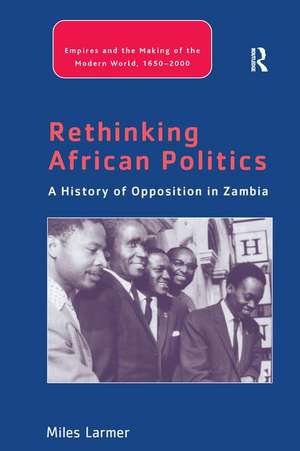Rethinking African Politics: A History of Opposition in Zambia: Empire and the Making of the Modern World, 1650-2000
Autor Miles Larmeren Limba Engleză Paperback – 2 sep 2016
Preț: 338.33 lei
Preț vechi: 401.86 lei
-16% Nou
Puncte Express: 507
Preț estimativ în valută:
64.74€ • 68.08$ • 53.49£
64.74€ • 68.08$ • 53.49£
Carte tipărită la comandă
Livrare economică 17 aprilie-01 mai
Preluare comenzi: 021 569.72.76
Specificații
ISBN-13: 9781138251144
ISBN-10: 1138251143
Pagini: 340
Dimensiuni: 156 x 234 mm
Greutate: 0.45 kg
Ediția:1
Editura: Taylor & Francis
Colecția Routledge
Seria Empire and the Making of the Modern World, 1650-2000
Locul publicării:Oxford, United Kingdom
ISBN-10: 1138251143
Pagini: 340
Dimensiuni: 156 x 234 mm
Greutate: 0.45 kg
Ediția:1
Editura: Taylor & Francis
Colecția Routledge
Seria Empire and the Making of the Modern World, 1650-2000
Locul publicării:Oxford, United Kingdom
Notă biografică
Dr Miles Larmer is Associate Professor of African History at the University of Oxford. He has written extensively on the history and politics of central and southern Africa, particularly in Zambia and the Democratic Republic of Congo. His current research focuses on the Katangese gendarmes and war in central Africa from the 1960s to the present day.
Recenzii
’During the past few years, Miles Larmer [...] has made a noteworthy contribution to the writing of Zambia’s post-colonial history. This important book represents the summation of his efforts so far.’ The Round Table ’... Rethinking African Politics is a welcome, thought-provoking and useful contribution to our knowledge of African opposition movements, and one that has wide-reaching significance for how we think about African history and political change. In short, Larmer's latest monograph deserves to become required reading throughout African studies.’ The Journal of Modern African Studies 'This book is highly recommended to those with political ambitions and interests, to educators, to clergy members, and to all Zambian citizens.' African Studies Quarterly 'With this book, Miles Larmer provides a welcome historical study of postcolonial politics in Zambia.' Journal of African History
Cuprins
Introduction; Chapter 1 Becoming Zambia – UNIP and the transition to independence in Northern Rhodesia, 1952–1964; Chapter 2 UNIP Rule and Division in Zambia’s First Republic, 1964–1973; Chapter 3 Disunity under the One-party State, 1973–1979; Chapter 4 The Mushala Rebellion; Chapter 5 Intellectual Elites and the 1980 Coup Attempt; Chapter 6 ‘We Have to Think for Other People’: Zambia and South Africa; Chapter 7 The State, Civil Society and Social Movements: Church and Labour in Post-colonial Zambia; Epilogue After UNIP: Political Change and Continuity in Zambia’s Third Republic, 1991–2010; Conclusion Towards a History of Post-colonial Politics in Africa;
Descriere
This study examines the nature of government and political opposition in Zambia, in the years immediately following its independence in 1964. It shows how Kenneth Kaunda's United National Independence Party's (UNIP) grip on the new nation-state was, in contrast to official rhetoric, partial, uneven and consistently prone to challenge. Drawing on extensive archival research and interviews, Larmer offers a ground-breaking analysis of post-colonial political history which helps explain the challenges facing contemporary African polities.











